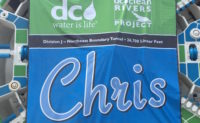In an industry whose services often are out of public view, the District of Columbia Water and Sewer Authority, known as DC Water, is making a big splash. DC Water, an independent public authority, serves more than 2.2 million people in a 725-sq-mile area around the nation's capital.
The agency also operates what it says is the world's largest advanced wastewater treatment plant. Now partway through a 10-year, $4-billion capital program, DC Water is experiencing the largest expansion in its history. To meet that challenge, the authority is embracing innovative technology and adopting progressive business practices.
Because of these efforts, ENR MidAtlantic has named DC Water its 2014 Owner of the Year.
Going Big
George Hawkins, DC Water's general manager since 2009, says that the agency was run well in the past but adds that the industry's traditional "heads-down" approach is no longer viable, given its current regulatory-compliance requirements and service-reliability needs.
"We want to transform ourselves into a different enterprise—one that is well-engaged with the public and other stakeholders, and one people want to do business with," Hawkins says.
That approach has manifested itself in increased use of design-build procurement; enhanced collaboration with engineering and construction consultants; and more outreach to ratepayers to explain where their money is going and why.
The $4-billion capital program's largest component, the $2.6-billion Clean Rivers Project, will create a network of storage tunnels and green infrastructure to address long-standing combined sewer overflow issues across the district.
A joint venture of Traylor Brothers, Alexandria, Va.; Skanska USA, Washington; and Jay Dee Contractors, Livonia, Mich., began work on the project's first tunnel in 2013. The team is using a giant tunnel boring machine—nicknamed "Lady Bird"—to chew a 26-ft-dia path through nearly four miles of silt and clay beneath and alongside the Anacostia River. The $330-million tunnel will connect the 370-million-gallons-per-day Blue Plains Advanced Wastewater Treatment Plant and the main southeast D.C. pumping station.
DC Water's other major initiative is a $400-million anaerobic digester that, when completed, will be the first North American facility to use the advanced Cambi thermal hydrolysis treatment process.







